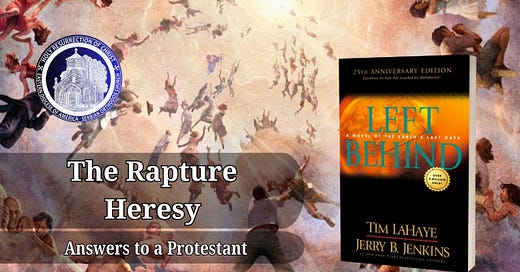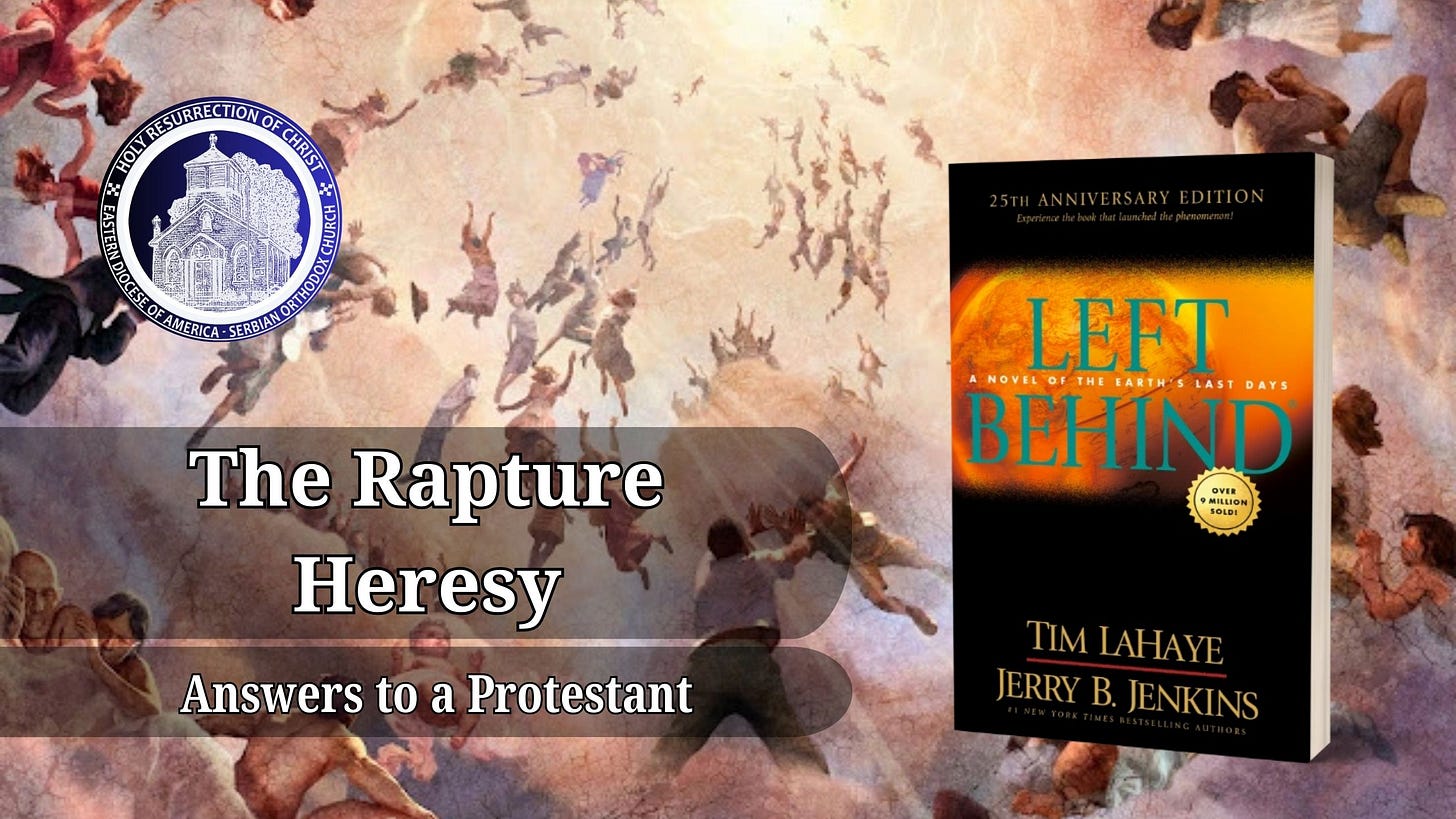The Heresy of Rapture
While popular in some Protestant traditions, the Rapture is not part of the Orthodox Christian teaching. Let’s explore why this is considered heresy from an Orthodox perspective
While popular in some Protestant traditions, the Rapture, as popularly understood, is not part of the Orthodox Christian teaching. Let’s explore why this is considered heresy from an Orthodox perspective.
The Rapture is the idea that Christ will secretly return to take the faithful into heaven before a period of tribulation on earth. This doctrine originates primarily from a 19th-century interpretation of Scripture by John Nelson Darby, later popularized through books like The Late Great Planet Earth and the Left Behind series. It is based on a novel interpretation of Scripture and is not found in the teachings of the early Church Fathers or the undivided Church. Orthodoxy relies on the Apostolic Tradition and the consensus of the Fathers, rejecting theological innovations. But does this idea hold up against the teachings of the early Church and Holy Scripture?
Orthodox Christianity understands the Second Coming of Christ as a singular, glorious, and public event. In the Nicene Creed, we confess, “He shall come again with glory to judge the living and the dead; His kingdom shall have no end.” There is no mention of a secret rapture followed by a second, Second Coming.
Misinterpretation of Scripture
The primary scriptural texts used to support the Rapture are 1 Thessalonians 4:16-17 and Matthew 24:40-41. Let’s examine these.
In 1 Thessalonians, St. Paul writes: "For the Lord Himself will descend from heaven with a shout, with the voice of an archangel, and with the trumpet of God. And the dead in Christ will rise first. Then we who are alive and remain shall be caught up together with them in the clouds to meet the Lord in the air."
This is a description of the Second Coming, not a secret removal of believers. At the Second Coming, Christ will return visibly and gloriously to judge the living and the dead, not to secretly "rapture" the faithful.
Orthodox Christians affirm this passage, but we understand it as describing the resurrection and the final judgment. The imagery of being “caught up” signifies our gathering to Christ at His Second Coming, an event that will be visible and evident to all creation.
In Matthew 24:40-41, "Then two men will be in the field: one will be taken and the other left. Two women will be grinding at the mill: one will be taken and the other left." Jesus speaks of one being taken and the other left. This passage refers to the suddenness of Christ's return and the separation of the righteous and the unrighteous at the final judgment, not a pre-tribulation event. This, too, is understood in the context of the final judgment, where the separation of the righteous and the unrighteous takes place. It does not imply a hidden removal of believers.
Distortion of Eschatology
The rapture doctrine divides Christ's return into two phases:
A secret rapture for the Church.
A later visible Second Coming.
Orthodox eschatology teaches that the Second Coming of Christ will be a single, universal, and glorious event. At this time, the resurrection of the dead, the final judgment, and the establishment of the new heaven and earth will occur (Matthew 25:31-46, Revelation 21:1-4).
Undermining of Christian Life and Suffering
The rapture doctrine often promotes an escapist mentality, suggesting that believers will avoid tribulation. Orthodox Christianity teaches that suffering and trials are part of the Christian journey, through which believers are called to bear their crosses and be purified (Matthew 16:24, Acts 14:22). The Church has historically prepared its members for persecution, not an escape from it.
The Rapture doctrine is problematic because it separates the Church from suffering. Orthodoxy teaches that the Church has always endured tribulation. Christ Himself said, “In the world you will have tribulation; but be of good cheer, I have overcome the world” (John 16:33). The idea that Christians will escape suffering undermines the reality of the Cross and the call to carry our own crosses daily.
Moreover, the Rapture fosters an escapist mentality, shifting focus from living a life of repentance and preparation for the Second Coming to speculating about timelines and events. This is contrary to the Orthodox ethos of constant vigilance and prayer, as Christ taught: “Watch therefore, for you do not know what hour your Lord is coming” (Matthew 24:42).
Focus on Sensationalism Rather than Repentance
The rapture doctrine can distract from the central message of the Gospel: repentance, love, fight against sin, the passions and preparation for the coming of Christ. Orthodoxy emphasizes watchfulness (nepsis) and spiritual readiness through prayer, fasting, and the sacraments, rather than speculative end-times scenarios.
Orthodox Eschatological Vision
Orthodox Christianity looks forward to the Second Coming of Christ as a singular, cosmic event where:
The dead will be raised.
Humanity will be judged.
The faithful will enter eternal communion with God in His Kingdom.
This understanding is rooted in Scripture, the writings of the Church Fathers, and the liturgical life of the Church, which proclaims: "Christ will come again in glory to judge the living and the dead, and His Kingdom will have no end." (Nicene Creed)
In rejecting the rapture doctrine, the Orthodox Church calls believers to focus on living a life of faith and repentance, preparing for Christ's return in a spirit of humility and hope.
The Church Fathers and Saints consistently affirmed the unity of Christ’s Second Coming as a singular event. St. John Chrysostom, commenting on 1 Thessalonians, teaches that all believers will meet Christ at His glorious return, not at separate times. The idea of a secret rapture was unknown in the early Church.
So, how should we prepare for Christ’s return? Not by speculating about a rapture but by living a life of holiness, prayer, repentance and love. The Orthodox path is one of transfiguration, repentance, and spiritual vigilance. We are called to endure trials, not to escape them, trusting in God’s grace to sustain us.
The Rapture is a modern innovation that contradicts the scriptural and patristic teachings of the Orthodox Church. As Orthodox Christians, we are called to hold fast to the faith delivered once for all to the saints, focusing not on speculative theories but on living lives of faith, repentance, and love.
Let us prepare for Christ’s return by being vigilant, enduring trials with patience, and trusting in His infinite mercy. In this way, we will be ready to meet Him when He comes again in glory to judge the living and the dead
.







